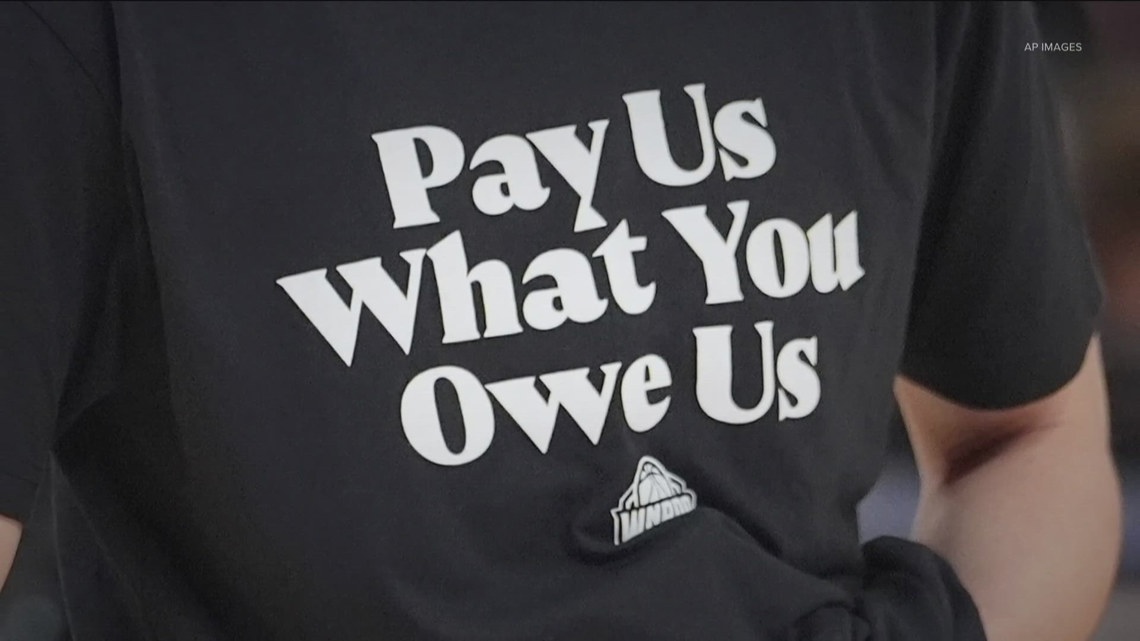Players say they deserve a larger percentage of WNBA revenue at a time when viewership, revenue and team valuations keep rising.
MINNEAPOLIS — On a night when the WNBA’s biggest stars shared a single stage, a single wardrobe choice put their future in the spotlight.
During warm-ups for the WNBA All-Star game in Indianapolis on Saturday, members of both teams wore black t-shirts bearing a simple message about their ongoing contract negotiations: ‘Pay Us What You Owe Us.’
“There’s not going to be another time – this year – before the (Collective Bargaining Agreement) gets done, that we’re all together like this,” said Minnesota Lynx Star Napheesa Collier, after the game. “You have to take advantage of those because it doesn’t happen often.”
Despite winning All-Star MVP, Collier, who is also Vice President of the WNBPA Executive Committee, spent most of her time after the game talking to media about that pregame statement.
“We feel like we are owed a piece of that pie that we helped to create,” Collier said. “So that’s basically what that is.”
“I love that slogan, ‘Pay Us What You Owe Us,'” said David Berri, a professor of economics at Southern Utah University who has spent the past decade covering the business of the WNBA. “They’re not asking for charity. They’re not asking for a handout. They’re saying, ‘Look, we’ve built up a business for you. We’re the ones that people are coming to see, pay us for doing that.'”
Berri says there’s plenty of history, and math, to back up that argument being made by the players.
“WNBA players get less than 7% of (league) revenue,” he said. “The top salary in the WNBA right now is less than $250,000. The NBA 50 years ago was paying its top players $400,000 a year, and that was (at a time) when the NBA only had $30 million in revenue 50 years ago. The WNBA is at $300 million in revenue, at least, and we also know that with the new television deal, it’ll be at least $500 million.”
Collier emphasized the pay versus revenue disparity during her postgame comments this weekend.
“We get a very tiny percentage of all the money that’s made through the WNBA, which obviously is through… the entertainment that we provide,” she said. “So we want a fair and reasonable percentage of that.”
With the current CBA set to expire at the end of October, the question is now what “fair and reasonable” will equate to.
“That’s a great question. Fairly depends on how much revenue does the WNBA have?” Berri said. “We only have estimates. Now if it’s $500 million and the players get half, like the NBA does, then there’s $250 million to split up. You have less than 250 people (in the WNBA), so the average has to be more than a million dollars per player.”
NBA owners, who still control more than half of WNBA teams, have long argued that the women’s game is still losing money, but Berri is among a growing number of people not buying it.
“There is no evidence the WNBA doesn’t make money,” he said. “They never open their financial books and say, ‘Hey, we’re not making any money.’ They don’t say that, they just assert it, even though that’s not believable, because revenues have exploded.”
Investors in the league don’t seem to be afraid of it’s profitability either.
The WNBA is in the midst of an expansion that will see six teams join the league by 2030. The last of those new teams, in Cleveland, Detroit and Philadelphia, reportedly paid a record $250 million each in franchise fees. That’s reportedly twice the amount paid by teams in Portland and Toronto. It’s also five times the $50 million franchise fee paid by the Golden State Valkyries. Despite that cost, Sportico has already valued the Valkyries franchise at $500 million.
“You have all these cities lining up wanting expansion franchises, you have these huge increases in franchise values,” Berri said. “The investors are putting money into this. How can you claim they’re not making money? Why are the investors investing then?”
That skepticism toward the WNBA’s claims appears to be growing. After the All-Star game, fans throughout the arena began chanting ‘pay them’ while WNBA Commissioner Cathy Engelbert was presenting the MVP trophy to Collier.
“The fans doing that chant… that gave me chills,” Collier said.
“That’s a very good sign, cause that’s what the women did in soccer,” Berri said. “They got the fans behind them, and you’ve got to get the fans on your side so that when the NBA makes their argument, nobody’s agreeing with them.”

